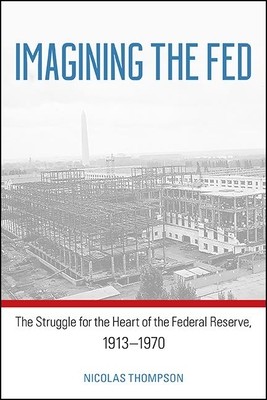
- We will send in 10–14 business days.
- Author: Nicholas Thompson
- Publisher: State University of New York Press
- ISBN-10: 1438482582
- ISBN-13: 9781438482583
- Format: 15.2 x 22.9 x 1.4 cm, softcover
- Language: English
- SAVE -10% with code: EXTRA
Reviews
Description
Imagining the Fed traces a six-decade struggle to shape the Federal Reserve's policymaking organs, the Washington-based Board and the Federal Open Market Committee. Conventional wisdom holds that Congress ended the system's struggle in 1935 by granting the Board a voting majority on the open market committee, establishing its Fed primacy. Yet, this book shows that the Fed's struggle continued flaring to yield consequential changes until 1970, when the modern Fed emerged.Nicolas Thompson explores how the Fed's evolution from a weak and fragmented sprawl into the world's most powerful central bank paralleled broader changes in the American polity. The rise and fall of hegemonic political parties remade the Board and elevated its Fed position, while the wars of the twentieth century concentrated Fed power in New York. When peace returned, however, system agents inherited a central bank that veered from the law, inviting renewed struggle. This process continued into the 1960s, when an ascendant Democratic Party loaded the Board with economists, who remade it in their image. Later partisan choices to launch unfunded wars at home and abroad unleashed inflationary forces which severed the dollar's link to gold. Freed from its golden fetters, monetary policy emerged as a domestic policy realm and Fed power durably concentrated in a new Board technocracy.
EXTRA 10 % discount with code: EXTRA
The promotion ends in 19d.16:44:16
The discount code is valid when purchasing from 10 €. Discounts do not stack.
- Author: Nicholas Thompson
- Publisher: State University of New York Press
- ISBN-10: 1438482582
- ISBN-13: 9781438482583
- Format: 15.2 x 22.9 x 1.4 cm, softcover
- Language: English English
Nicolas Thompson explores how the Fed's evolution from a weak and fragmented sprawl into the world's most powerful central bank paralleled broader changes in the American polity. The rise and fall of hegemonic political parties remade the Board and elevated its Fed position, while the wars of the twentieth century concentrated Fed power in New York. When peace returned, however, system agents inherited a central bank that veered from the law, inviting renewed struggle. This process continued into the 1960s, when an ascendant Democratic Party loaded the Board with economists, who remade it in their image. Later partisan choices to launch unfunded wars at home and abroad unleashed inflationary forces which severed the dollar's link to gold. Freed from its golden fetters, monetary policy emerged as a domestic policy realm and Fed power durably concentrated in a new Board technocracy.


Reviews